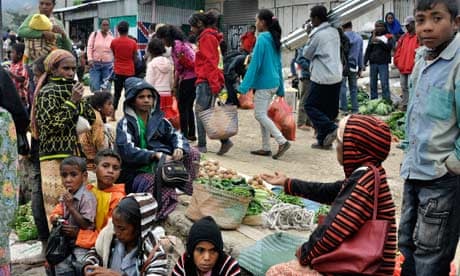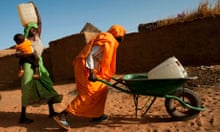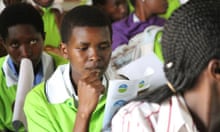Every minute, someone dies from armed violence somewhere in the world (pdf), according to human rights groups and peace campaigners. Though the number of international conflicts has decreased in recent decades, achieving lasting global peace remains an elusive goal.
Next week, world leaders will gather at the UN headquarters in New York to discuss, among other topics, a new global development agenda. The body's eight millennium development goals, which include the eradication of extreme poverty and hunger, expire in 2015, giving UN member states the opportunity to shape the future of development. They also have the chance to position peace and stability at the centre of the debate.
In countries marred by conflict and disaster, development tends to focus on promoting economic growth and progress in specific social sectors such as health and education. Fundamental issues for lasting peace and stability – rule of law and justice, good governance, social cohesion, economic and environmental sustainability – are often left at the margins.
If we continue with the current model, the already costly global and local implications will increase. We are seeing increases in the recurrence, longevity and diffusion of conflict, the incidence and severity of disasters, degradation of the environment, depletion of natural resources, transnational crime, volatility in societies previously characterised as stable, financial crises and various forms of inequality. These trends are interconnected.
At the UN development programme (UNDP), where our mandate directs us to respond to crises and support long-term progress, it is our experience that sustainable development is tied to the advancement of lasting peace and stability.
To my surprise, I often hear arguments against including peace and stability in a new global development agenda. One of the most common of these arguments is that building long-term peace and stability is separate from the work of long-term human development. In fact, peace and stability do not fall outside of the boundaries of development. The two must go hand in hand.
Violence not only claims lives, but also unravels the very fabric of society, leaving schools and hospitals destroyed and a devastated population suffering the physical and psychological toll. If we look at the facts, nine out of 10 countries with the lowest human development index have experienced conflict within the past 20 years, and about 40% of fragile and post-conflict countries relapse within a decade.
Investing in peace, stability and transparent and accountable governance is fundamental to long-term development and prosperity. In Ghana, once known for political instability, military coups and violence, nationally led efforts with international support to address inter-ethnic tensions and promote dialogue across all sectors of society has paid off.
Ghana boasts 25 years of stability, four peaceful elections and has achieved significantly larger and more rapid increases in its human development index (HDI) than predicted for countries at a similar level of HDI value in 1990.
Another argument I often hear is that mixing peace and security efforts with development work can compromise national sovereignty. The reality is that early action to address the root causes of crisis, such as social inequality or low access to justice and security, is key to preventing brewing tensions from escalating into full-blown conflict. Waiting for the security council to intervene under "exceptional circumstances" may prove too late for many thousands of people.
In today's world of social media and instant connectivity, ideas and even violence can spread like wildfire. One dramatic and tragic act of protest by a fruit seller in Tunisia ignited simmering tensions across borders in the region.
The uprisings that followed were a reflection of tensions and social and economic inequalities that had been beneath the surface for years. Had an alternative development pathway based on inclusive growth and the rule of law been followed, the outcome could have been different.
Some also argue that we cannot work effectively towards these goals because peace and stability cannot be measured. Though our experience with measuring progress against these outcomes is more limited than our experience with measuring progress towards socioeconomic outcomes, the fact that they are measurable is beyond dispute. A plethora of initiatives, tools and mechanisms exist for the purpose of identifying and measuring conflict- and violence-prevention outcomes, including within the UN organisations.
In Timor-Leste, for example, when returning refugees and internally displaced people destabilised the country's fragile peace between 2007-09, the UNDP and its partners trained community mediators to decrease tensions around land ownership and helped the government to establish a department for peace-building. Up to 13,000 families were able to return peacefully to their homes by 2010.
To evaluate these and other results, UNDP tracks success in terms of milestones a country achieves – from accepting the need for development and conflict prevention to including such prevention (pdf) within national policies.
While armed violence and conflict continue to take lives, destroy infrastructure and deplete employment opportunities, their most destructive force lies in derailing states and societies from their long-term development goals and prospects for a better future. During the forthcoming discussions surrounding the next global development framework to succeed the millennium development goals, world leaders must work together to include peace, good governance and stability at the centre of the debate.




Comments (…)
Sign in or create your Guardian account to join the discussion